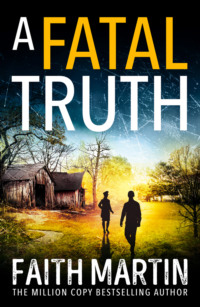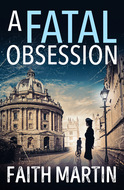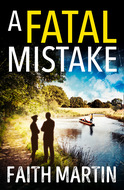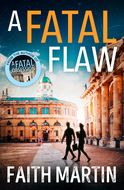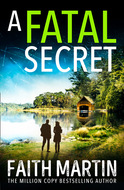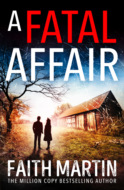Kitap dosya olarak indirilemez ancak uygulamamız üzerinden veya online olarak web sitemizden okunabilir.
Kitabı oku: «A Fatal Truth»
About the Author
FAITH MARTIN has been writing for nearly thirty years, under four different pen names, and has published over fifty novels. She began writing romantic thrillers as Maxine Barry, but quickly turned to crime! As Joyce Cato she wrote classic-style whodunits, since she’s always admired the golden-age crime novelists. But it was when she created her fictional DI Hillary Greene, and began writing under the name of Faith Martin, that she finally began to become more widely known. Her latest literary characters WPC Trudy Loveday, and city coroner Dr Clement Ryder, take readers back to the 1960s, and the city of Oxford. Having lived within a few miles of the city’s dreaming spires for all her life (she worked for six years as a secretary at Somerville College), both the city and the countryside/wildlife often feature in her novels. Although she has never lived on a narrowboat (unlike DI Hillary Greene!) the Oxford canal, the river Cherwell, and the flora and fauna of a farming landscape have always played a big part in her life – and often sneak their way onto the pages of her books.
Readers love the Ryder & Loveday series
‘Insanely brilliant’
‘I absolutely loved this book’
‘Faith Martin, you’ve triumphed again. Brilliant!’
‘If you haven’t yet read Miss Martin you have a treat in store’
‘I can safely say that I adore the series featuring Dr Clement Ryder and Probationary WPC Trudy Loveday’
‘This book is such a delight to read. The two main characters are a joy’
‘Yet another wonderful book by Faith Martin!’
‘As always a wonderful story, great characters, great plot. This keeps you gripped from the first page to the last. Faith Martin is such a fantastic author’
Also by Faith Martin
A Fatal Obsession
A Fatal Mistake
A Fatal Flaw
A Fatal Secret
A Fatal Truth
FAITH MARTIN

HQ
An imprint of HarperCollinsPublishers Ltd.
1 London Bridge Street
London SE1 9GF
First published in Great Britain by HQ in 2020
Copyright © Faith Martin
Faith Martin asserts the moral right to be identified as the author of this work.
A catalogue record for this book is available from the British Library.
This novel is entirely a work of fiction. The names, characters and incidents portrayed in it are the work of the author’s imagination. Any resemblance to actual persons, living or dead, events or localities is entirely coincidental.
All rights reserved under International and Pan-American Copyright Conventions. By payment of the required fees, you have been granted the non-exclusive, non-transferable right to access and read the text of this e-book on-screen. No part of this text may be reproduced, transmitted, downloaded, decompiled, reverse engineered, or stored in or introduced into any information storage and retrieval system, in any form or by any means, whether electronic or mechanical, now known or hereinafter invented, without the express written permission of HarperCollins.
E-book Edition © June 2020 ISBN: 9780008336165
Version: 2020-03-02
Table of Contents
Cover
About the Author
Readers love the Ryder & Loveday series
Also by Faith Martin
Title Page
Copyright
Dedication
Prologue
Chapter 1
Chapter 2
Chapter 3
Chapter 4
Chapter 5
Chapter 6
Chapter 7
Chapter 8
Chapter 9
Chapter 10
Chapter 11
Chapter 12
Chapter 13
Chapter 14
Chapter 15
Chapter 16
Chapter 17
Chapter 18
Chapter 19
Chapter 20
Chapter 21
Chapter 22
Chapter 23
Chapter 24
Chapter 25
Chapter 26
Chapter 27
Chapter 28
Chapter 29
Chapter 30
Chapter 31
Chapter 32
Chapter 33
Chapter 34
Chapter 35
Chapter 36
Extract of A Fatal Affair
Author’s Note:
Dear Reader …
Keep Reading …
About the Publisher
For all my readers who remember the 1960s with affection. And to all my readers too young to remember them!
PROLOGUE
Oxford, 1961
The firework that was later to be accused of killing a man was just an ordinary rocket, made by the Standard Company of Huddersfield. Along with others of its kind – such as Catherine wheels, Roman candles, the ever popular bangers, and more exotic beauties, such as Mount Vesuvius, short fountains, air bombs and star shells – it had been purchased for Bonfire Night. It had been manufactured to do nothing more controversial than contribute to a half-hour or so of noisy, colourful entertainment for one and all.
That year, November 5th fell on a Sunday night, which many couldn’t help but feel was an ideal time for such celebrations. It meant that the man of the house didn’t have to worry about getting home from work as fast as possible and then gulping down his tea, thus risking incipient indigestion. Rather, he could take his time before doing his duty for his clamouring, over-excited children by setting light to the bonfire and then overseeing the traditional letting off of the fireworks, and all just before their bedtime.
Alas, that year, the weather didn’t deign to co-operate, and instead of producing the cold, frosty, clear night that everyone had been hoping for, brought torrential rain and high winds.
Some wisely opted to put off the celebrations until the following night. Most, being British, gamely ploughed on. After all, if the odd firework, caught by the wind, veered off and broke the window of someone’s new conservatory … well, there was no real harm done, was there? Rattan furniture, if it caught fire, could easily be replaced. Except that there was nearly always going to be an exception to prove the rule.
And in the suburb of Headington, set high on a hill, overlooking the beautiful city of Oxford, one firework was fated to be accused of doing something very naughty indeed. In fact, it was to be accused of ending the life of a certain Mr Thomas Hughes, a retired businessman of some standing in his community.
Ironically enough perhaps, Guy Fawkes, who was responsible for instigating Bonfire Night celebrations in the first place, might well have appreciated the murderous consequences of the aforesaid rocket. After all, his gunpowder plot in the basement of Parliament had been intended to help quite a number of people into the after world.
But of Guy Fawkes’s guilt there had been no doubt.
As to that of the rocket … well, some people, when all the facts about what had happened that night were examined in the cold light of day, had their doubts. Some people, in fact, began to seriously wonder if the rocket might not have been innocent all along.
Chapter 1
Dr Clement Ryder, Coroner for the city of Oxford, looked out over his courtroom feeling distinctly satisfied. The start of any new and potentially interesting case always gave him a sense of anticipation. Not that investigating the circumstances of some poor unfortunate’s death was something to look forward to exactly. However, there was something to be said for overseeing the necessary telling of a sad and significant event.
A handsome man in his mid-to-late fifties, he looked around, noting that the press bench was almost full. He recognised some of the various reporters from the Oxford Times, Mail and Tribune, and wasn’t surprised to see representatives from other county newspapers as well. It wasn’t often one of the city’s more prominent and wealthy members burned to death in the family shed.
It was a wet and cold Monday morning in November, lending the courtroom a grey and melancholy air, and for some of the more superstitious in attendance, the fact that the date was the 13th only added to a general sense of foreboding. The coroner’s usher, however, showed no sense of unease as he called the first witness.
Mrs Alice Wilcox, née Hughes, eldest daughter of the victim, rose from her seat and took the stand, going through the usual formalities with a firm, low, but thankfully quite carrying voice.
Clement regarded her thoughtfully. He knew from his preliminary reports that she was forty-two years old, but she looked rather older. She was about five feet six and slightly plump, but she was dressed in a smart powder-blue skirt and jacket outfit, with a plain white blouse that did its best to hide the fact. Her greying, auburn hair was held up in a firm, no-nonsense chignon, and when she turned to look at him, Clement became aware of how pale she was under her make-up. She also clutched her handbag tightly, showing the whiteness of her knuckles, and her large hazel-coloured eyes were wide with trepidation.
Clement gave her a gentle smile. No doubt she’d been dreading this moment for some days now, and he wanted to put her at her ease as quickly as possible.
‘Thank you for your attendance, Mrs Wilcox, I understand how difficult this must be for you. I’ll try to be as brief as possible. If you need some water, or at any time feel like you’d need to rest, just say so,’ he informed her kindly.
‘Thank you,’ she murmured.
‘Now, I understand your father, Thomas Hughes, lived with you at your family home in Headington? Is that right?’
‘Yes. Father was widowed a while ago, and found it lonely to go on living alone. So he sold his house and bought a larger property in Headington, with the understanding that myself, my husband and my children would also live there. Since we were beginning to feel rather cramped in our own house, which we were renting, it worked out well for everyone. And it meant I could look after Father too, of course.’
‘I see. That sounds very sensible,’ Clement said. ‘Your children are Olivia, aged fifteen, and Lucas, aged twelve?’
‘Yes.’
‘And on the 5th of the month, Bonfire Night, you held a bonfire and fireworks party for all the family in your back garden?’ he prompted.
‘Yes. Father always put on a big display for us when we were children, and he kept it up for his grandchildren. That’s why all the family was there, not just those of us with children of our own.’
Clement nodded. ‘The other children belonged to your brother Matthew …’ He looked down to check his notes. ‘Benjamin, Clarissa and Helen?’
‘Yes – they’re a fair bit younger than my own, and so were very excited at the prospect. Grandpa’s fireworks parties were always a big event for them. He threw one every year.’
‘Also present were your brother Godfrey and your sister Caroline?’
‘Yes, it was always very much a family affair,’ Alice agreed, her lips firming into a thin line. She was so obviously determined not to break down, that Clement felt he could now safely ask her to tell them what the jury and the members of the press were all so eager to hear about.
‘In your own words, can you tell us what happened this particular Bonfire Night, Mrs Wilcox?’
The dead man’s daughter drew in an audible deep breath and nodded. She also turned slightly, so that she was now looking at the jury, rather than the coroner.
‘Yes. It was Sunday, and the weather had been pretty bad all day. Rain and wind, and all that. At about five o’clock, just as it was getting fully dark, I asked Father if he thought we should cancel. Although the worst of the rain had abated a bit, it was still showery, and the winds were distinctly blustery.’
As if to underline this, outside a spatter of rain was suddenly thrown against the window by a wind that had been gradually building up overnight, and Clement saw several members of the public look up at the windows and shiver.
‘But Father wouldn’t hear of it,’ Alice carried on, her voice clear in the silent room. ‘He said he’d been at bonfire parties in the past when it had actually been thundering and lightning, and it had … never done him any harm.’
As the sheer inappropriateness of these words hit her, she faltered slightly, coughed and then ploughed gamely on. ‘He said he couldn’t let the children down, but he’d be careful to make sure that he picked a really good and sheltered spot in the garden from which to light the fireworks.’
‘Were there a lot of fireworks?’ Clement put in, knowing he needed to make the point for the jury.
‘Oh yes. Father was a fairly wealthy man, and whilst he was always very careful with money, he did, on occasion, like to indulge in certain things. And the annual bonfire party was one of those. So he’d bought boxes and boxes.’
‘And these were stored in the wooden shed at the back of the garden?’
‘Yes.’
‘Thank you. Please continue.’
Alice Wilcox again took a deep breath. ‘Well, when Father had got an idea fixed in his head, it was no use trying to talk him out of it,’ she said, then aware that this might sound disloyal, forced a brief smile to her pale lips. ‘Father was always a very strong-minded man, and he liked things just so.’
‘I understand,’ Clement soothed her. He could see she was getting flustered, thinking she’d said the wrong thing, and he helped her out with a brisk question. ‘Did the other members of the family ring to ask if the festivities would be cancelled?’
‘Oh no,’ Alice said. ‘They knew I would have telephoned them and let them know if Father’s plans had changed.’
‘I see. At what time was the fireworks display due to start?’
‘Six-thirty. Joan – that’s my brother’s Matthew’s wife – wanted to make sure her little ones were in bed by seven-thirty at the latest. So we lit the bonfire at about quarter past six, and then father went into the shed to begin collecting the fireworks.’
Again, the room became very quiet, with not even the odd shuffle of feet or the rasp of clothing against clothing to mar the stillness.
‘Was this the usual routine?’ Clement asked encouragingly.
‘Yes. We’ve lived at the big house in Headington since 1958, so we’d had three previous parties there, and that was always how Father did it. He wouldn’t have fireworks in the house, he said it wasn’t safe. In case of … fire.’
Alice dipped her head and faltered again on the last word. Somewhere, someone in the public section gave a soft gasp of sympathy.
‘He sounds eminently sensible,’ Clement said, keeping his voice both crisp and calm. He glanced down at his notes and said, ‘Your father was a retired businessman I understand?’
For some reason, this brought her head up sharply. She turned her attention from the jury back to the coroner, and Clement could see that she’d gone almost white. Her gaze, too, was definitely startled – and alarmed.
‘Well … yes, that’s right, yes he was,’ Alice mumbled, after a visible hesitation.
A handsome young man on the press bench smiled somewhat grimly at this, and made a quick, predatory note, his pencil digging deeply into the notebook on his lap.
Clement, not sure why such an innocuous question – which again he had asked only to help her out of an uncomfortable moment – should cause her such unease, moved on briskly.
‘Did you have difficulty lighting the bonfire? The wood and detritus must have got thoroughly soaked during the daytime rain?’
‘Oh yes, Godfrey and Kenneth had a real job getting it going. In the end, I think they used a little paraffin.’
‘This paraffin was normally kept stored in the shed?’ Clement asked gently.
‘Yes, I believe so,’ Alice acknowledged miserably.
‘And can you remember if the paraffin was returned to the shed once the bonfire was lit?’
‘I think so. Yes, I’m pretty sure I saw my brother put it back, just inside the door.’ Again, his witness responded unhappily, and he cast the jury a quick look to make sure they’d got the point. The garden shed, as well as containing a large stack of fireworks, was also the repository of other, very flammable materials.
‘What happened then?’
Alice squared her shoulders and lifted her chin. ‘Once the bonfire was going, I went back into the kitchen and began wrapping up some sausages and potatoes to put into the base of the bonfire. Father liked to make use of the fire to cook the food, as they did when he was a boy. Caroline, my sister, helped me with this.’
‘And then?’
‘I took them out, all piled onto a tray, and left them on an old iron garden table that we keep near the kitchen window. Later, when the bonfire wasn’t so fierce, I was going to push them into the base of the fire with an old shovel or something to bake. So I went in the shed for something to use, and, yes, I’m sure I remember Father coming up the path towards me as I left with an old rake. I assumed it was to get the fireworks. I smiled at him as he passed.’
Here she paused, then took another deep breath and pushed on. ‘I went back to the bonfire … no, wait, sorry. I went back into the kitchen again to fetch the hot chocolate for the children. That’s right. I’d just bought out the jug and mugs, and had put them on the table, when I heard a big bang behind me. It made me jump. Of course, I realised right away what it was,’ she said with a nervous smile. ‘It was a banger going off. I thought at first that it must have come from one of the neighbour’s back gardens. Children do so love bangers, don’t they?’ She managed another smile and shot a quick glance at the jury.
One or two of them smiled back at her and nodded.
‘But then I heard someone – I think it was my brother Matthew – shout something about the shed, and I turned around and saw flames were coming out of open doorway.’
‘The door was open?’ Clement emphasised.
‘Yes. Yes, I’m sure it was. As I watched, something colourful – all blue and red – started fizzing about inside, and I realised it was a firework.’
Clement glanced around the room. On a grey, wet, Monday morning in November, his courtroom looked chilly and dull, but the atmosphere was as tense as he’d ever seen it.
‘What did you do, Mrs Wilcox?’ Clement asked quietly.
‘Nothing,’ Alice said simply. ‘I didn’t know what to do. At first, I couldn’t understand it. I couldn’t think why Father would have let off a firework inside the shed.’
She looked down at her hands and shrugged. ‘I think I turned to Godfrey, who was standing closest to me, and asked him where Father was. I couldn’t see him, you see. I thought at first that he must just be standing in the dark, outside the light thrown up by the bonfire. But then I realised I couldn’t see him in the light from the kitchen window either. Then suddenly, there was this huge explosion of bangs and whizzes and coloured sparks, and it looked as if the shed trembled.’
The shed in question, he knew from the fire inspector’s report, had been a standard, six-by-ten foot wooden shed, common to gardens all over the country, where they were used to store garden tools, wheelbarrows, sacks of potatoes, winter logs and other odds and ends.
‘We all sort of … screamed. And then the shed roof began to really blaze,’ Alice said, gulping out the words now. ‘The smoke was really thick, and my husband, Kenneth, shouted out Father’s name and ran towards the shed, but as he did so, a rocket shot out of the door and veered off into the neighbour’s fence. It didn’t hit him, but it only missed by a few inches. I called at him to come back. I was afraid … You see, I didn’t want … I didn’t know, then, that Father was in the shed, and I didn’t understand why he was going so close and putting himself in danger like that.’
Her jerky words echoed around the silent room, as everyone digested her words – and the horror of the scene.
‘My brother Godfrey said something about Father not coming out of the shed, and then I realised … But by then, the whole shed was ablaze – the heat was infernal. And fireworks kept going off, explosion after explosion … It was like being back in the Blitz. I visited London once as a child during the war and I never forgot the air raid …’ She trailed off and shot the coroner a look of mute appeal.
‘Thank you, Mrs Wilcox, I think we’ll hear about the rest of the events from your husband now.’
‘Oh, thank you,’ Alice said and left the witness box with such alacrity, Clement had no chance to ask the jury if they had any further questions for her.
He looked curiously at the man who stood up to reach for his wife and help her back into her seat in the front row. Her spouse then said something soothing to her, before striding across to take his place on the witness stand.
In stark contrast to his wife, Kenneth Wilcox looked very business-like and calm. If he felt at all nervous at having to give evidence, it didn’t show as he was sworn in.
Clement knew his age was fifty, but unlike his wife, he wore his age much better, and could easily have passed for a decade younger. He was around five feet ten inches tall, and huskily built. He had an abundance of sandy hair, which showed no signs of silvering, and bright, almost electric-blue eyes. A neatly trimmed beard and moustache, just beginning to go salt-and-pepper, only added to his overall attractiveness.
‘You’re Mr Kenneth Wilcox, son-in-law of the victim?’ Clement began mildly.
‘Yes sir, that’s correct.’
‘You’ve just heard your wife’s testimony. Perhaps you can now tell us what you saw the night her father died?’
‘I’ll do my best. Like Alice said, we had a little trouble getting the bonfire to catch light, so in the end we had to use a sprinkling of paraffin.’
‘Whose suggestion was that?’ Clement slipped in.
The witness blinked slightly, then shrugged. ‘I’m not altogether sure. I think mine – or else maybe Godfrey’s?’
‘Go on,’ Clement said.
‘Yes. Well, we got the bonfire going. The kiddies were pleading with their grandfather to start letting off the fireworks, and I think he was teasing them, pretending he was going to make them wait or something, but I saw him eventually head off to the shed to collect them. He usually brought them out in a wheelbarrow.’
‘Were the fireworks stored in tin boxes, for safety?’ Clement asked sharply.
‘I have no idea, but I doubt it,’ Kenneth said flatly. ‘Otherwise, I can’t see how so many of them would have gone off like they did when the shed caught fire,’ he added logically.
Clement made a note and sighed. If only people would be more careful! ‘And how do you think the shed did catch fire, Mr Wilcox. Did you see anything strike it – say, another firework from someone else’s display?’
‘No, I don’t think so. The only thing I can think of is that some burning newspaper from the bonfire must have blown in on the wind, through the open door, and landed on one of the exposed fireworks. I wish now we’d never used that damned paraffin. Mind you, it wasn’t only the embers from our fire floating about – the wind was so strong, I think plenty of other bright orange bits and bobs blew in from the neighbours’ bonfires too.’
‘Did you actually see any burning newspaper or embers blown into the shed?’ Clement asked sharply.
‘No sir, I didn’t,’ his witness admitted honestly. ‘But then, I wasn’t really looking or taking much notice. I didn’t realise at the time that it might be important, unfortunately. Hindsight’s a wonderful thing, isn’t it?’
Clement nodded, acknowledging the truth of the man’s wry comment. He also knew from the police statements that none of the family there that night could tell them how the shed had caught fire, with such tragic consequences.
‘I see. Did your father-in-law carry an electric torch with him? It must have been dark inside the shed.’ Clement tried a new tack.
‘Yes, he did. A big, heavy, black rubber thing. He certainly didn’t go in there with a box of matches or a candle or an exposed flame, if that’s what you’re thinking,’ Kenneth Wilcox said smartly. ‘No one could accuse the old man of being such a fool!’
Out of the corner of his eye, Clement noticed someone, he thought on the press bench, make a sharp movement of some kind, but when he turned his head to look more closely, saw only industriously bent heads as they took down the witness’s words in their best shorthand.
‘I see. Did your father-in-law seem himself that day?’ Clement asked next.
‘What do you mean?’
‘Was he in good health? Did he have a cold, or was he in any way breathless?’
‘Oh, do you mean could he have been taken ill suddenly and somehow done something to set things in motion? No, I don’t think so,’ Kenneth Wilcox said, frowning thoughtfully. ‘He was always in good, hearty health as far as I know.’
‘I see. When were you first aware of there being a problem?’
‘When someone – I think it was Godfrey – said something like, “hoy, watch out, the shed’s on fire” or something along those lines. I looked, and sure enough, I could see smoke billowing out. Then the roof caught, and everything seemed to explode at once – whizzers and bangers, and what not. Rockets started shooting out – bloody dangerous it was, I can tell you. I realised at some point that my wife was asking everyone if they knew where her father was. And I suddenly realised that he wasn’t anywhere around, so he must still be in the shed. But it was impossible to get close to it. I yelled to Caroline to go inside and call the fire brigade. They arrived quickly, I’ll give them that, but by the time they arrived and hosed it down … well, they found my father-in-law’s body inside. Bloody awful it was, I can tell you.’
Clement didn’t think there was any point, in the circumstances, in upbraiding the man for his use of bad language, so instead merely nodded.
‘I think, at this point, that we should hear from the Fire Brigade, and then we’ll have the medical evidence,’ he said instead.
Ücretsiz ön izlemeyi tamamladınız.
